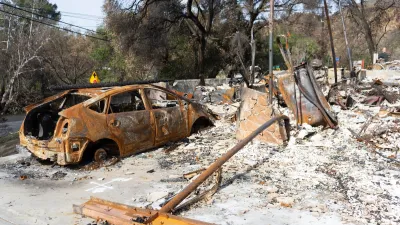A UCLA study reveals that language barriers left many Asian residents in Los Angeles County without critical wildfire evacuation and recovery information, highlighting the need for more inclusive emergency communication strategies.
A recent UCLA study highlights how language barriers hindered Asian communities’ access to emergency evacuation and recovery resources during the recent wildfires in Los Angeles County. As reported by Ruben Vives, the study found that over 12,000 Asian immigrants and their descendants within the four evacuation zones—Palisades, Eaton, Hurst, and Hughes—require language assistance. Many fire warnings and relief services were only available in English and Spanish, leaving limited-English-proficient residents without crucial information. Advocacy groups, such as the Asian American and Pacific Islanders Equity Alliance, stepped in to fill the gap by providing multilingual resources, but gaps in government communication persisted.
County officials acknowledged the issue, explaining that their emergency alert system, maintained by the Federal Emergency Management Agency (FEMA), only supports English and Spanish. However, they emphasized that other methods, including social media, in-person outreach, and multilingual staff at Disaster Resource Centers, were used to inform residents. Despite these efforts, researchers argue that more needs to be done to ensure clear, timely, and culturally appropriate communication, particularly in diverse neighborhoods with residents who speak a wide range of languages, including Chinese, Korean, Tagalog, Thai, and Vietnamese.
Experts stress the need for targeted emergency preparedness efforts that account for the linguistic and cultural diversity of Los Angeles County. The study found that older Asian residents were particularly vulnerable due to higher rates of limited English proficiency. Researchers and advocates are calling for stronger partnerships between government agencies and community organizations to improve language access in disaster response plans. Programs like California’s Listos initiative have demonstrated the importance of proactive community engagement, and advocates hope the county will adopt similar measures to prevent future communication breakdowns.
FULL STORY: Asian communities faced language barriers during L.A. wildfires, UCLA study says

Maui's Vacation Rental Debate Turns Ugly
Verbal attacks, misinformation campaigns and fistfights plague a high-stakes debate to convert thousands of vacation rentals into long-term housing.

Planetizen Federal Action Tracker
A weekly monitor of how Trump’s orders and actions are impacting planners and planning in America.

In Urban Planning, AI Prompting Could be the New Design Thinking
Creativity has long been key to great urban design. What if we see AI as our new creative partner?

King County Supportive Housing Program Offers Hope for Unhoused Residents
The county is taking a ‘Housing First’ approach that prioritizes getting people into housing, then offering wraparound supportive services.

Researchers Use AI to Get Clearer Picture of US Housing
Analysts are using artificial intelligence to supercharge their research by allowing them to comb through data faster. Though these AI tools can be error prone, they save time and housing researchers are optimistic about the future.

Making Shared Micromobility More Inclusive
Cities and shared mobility system operators can do more to include people with disabilities in planning and operations, per a new report.
Urban Design for Planners 1: Software Tools
This six-course series explores essential urban design concepts using open source software and equips planners with the tools they need to participate fully in the urban design process.
Planning for Universal Design
Learn the tools for implementing Universal Design in planning regulations.
planning NEXT
Appalachian Highlands Housing Partners
Mpact (founded as Rail~Volution)
City of Camden Redevelopment Agency
City of Astoria
City of Portland
City of Laramie





























